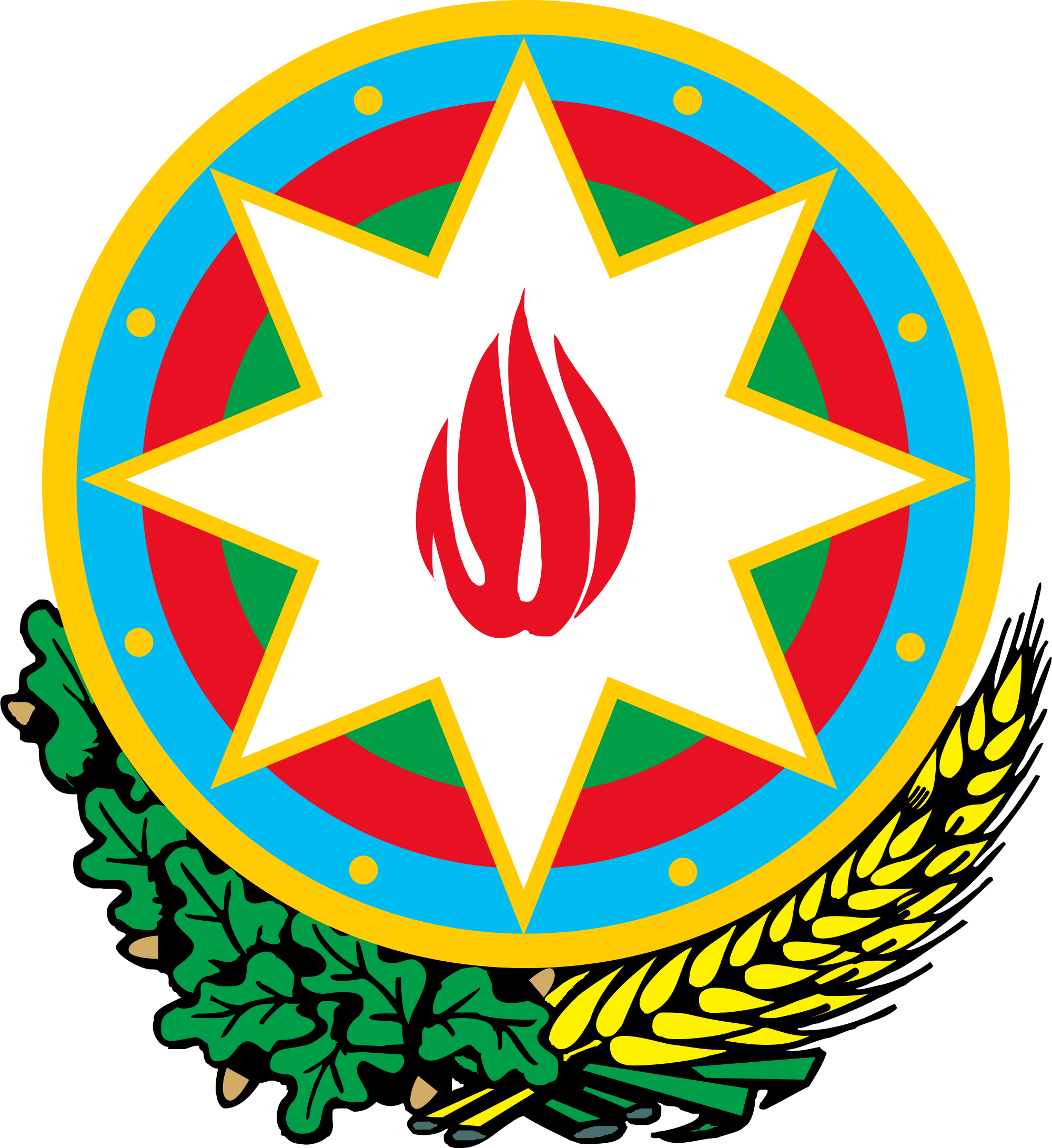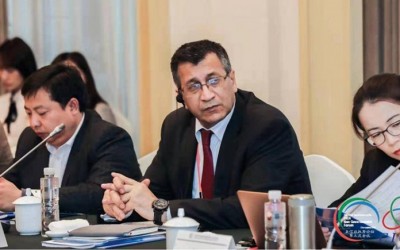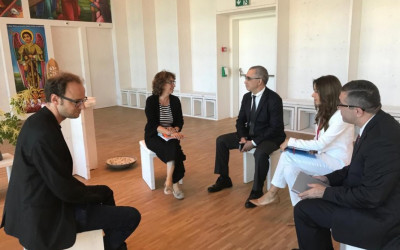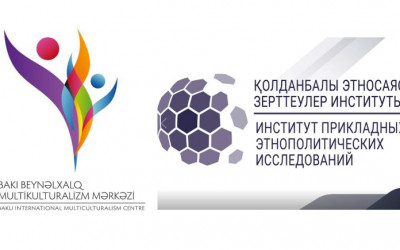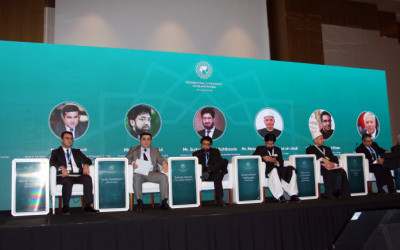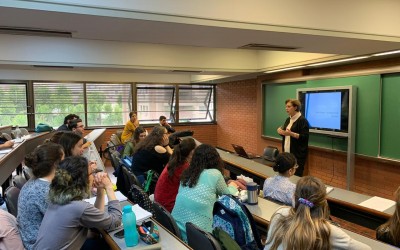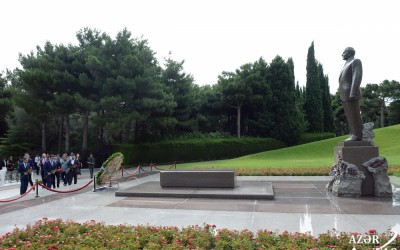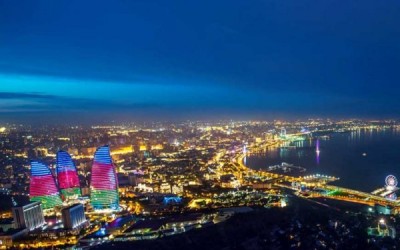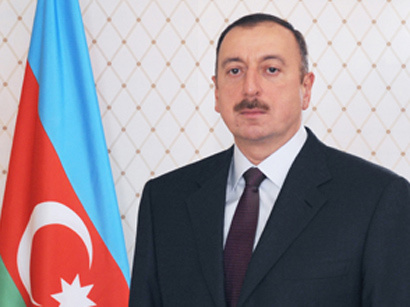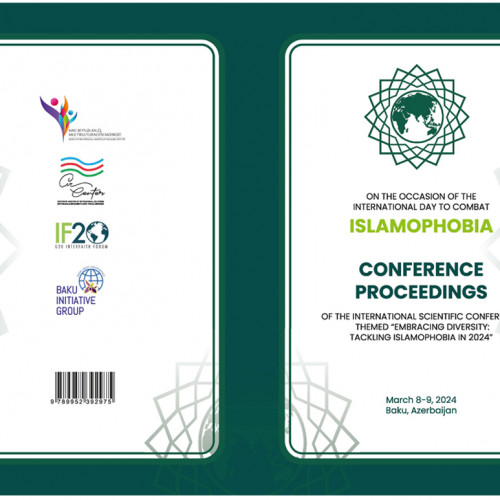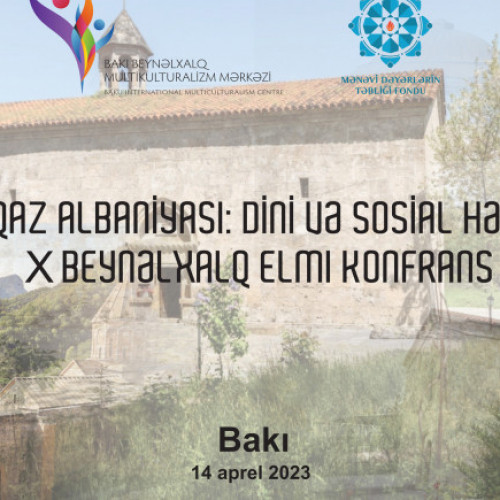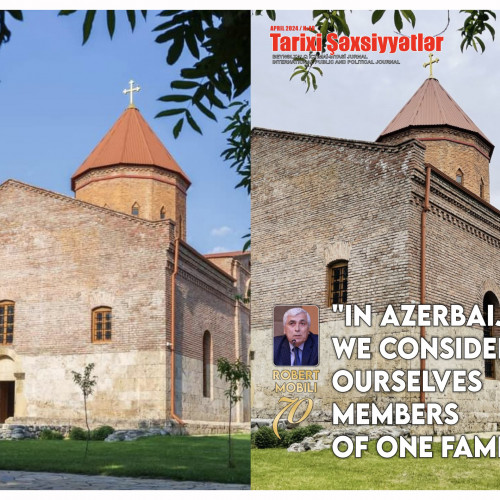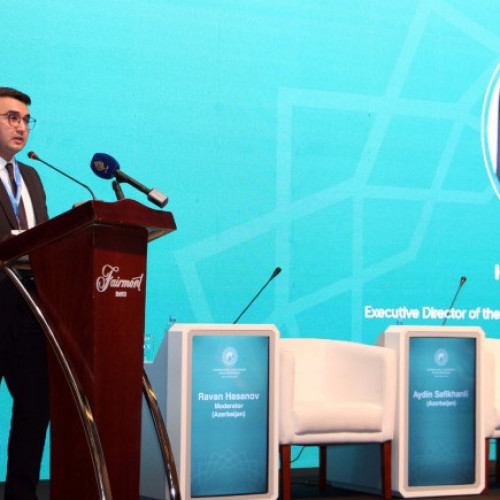At the crossroads of Europe and Asia, Azerbaijan pursues a policy of multiculturalism
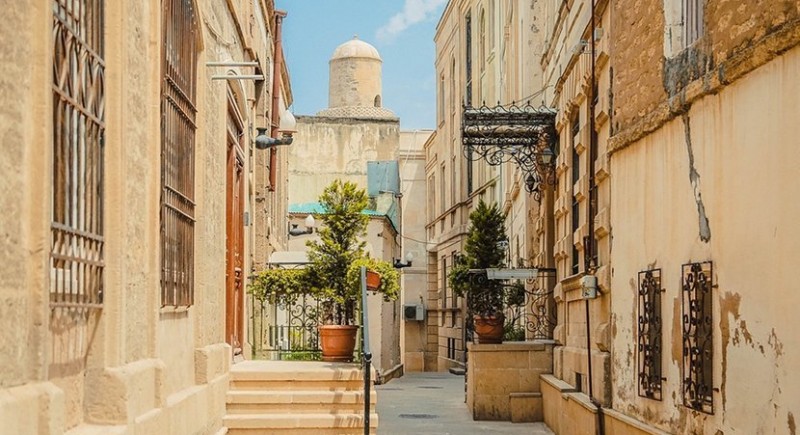
BAKU — What would you do if you were surrounded by Russia, Iran and Turkey? It’s a precipitous geopolitical position, especially for a country only about three decades old. Yet, somehow, Azerbaijan has managed to maintain its independence while nestled among these vying regional powers, while simultaneously retaining control of its booming oil reserves, building good relations with Israel and supporting a multi-ethnic society.
It’s a remarkable achievement — one that calls for deeper examination, which I have been doing since my return from visiting the Caucasus republic in the beginning of May.
I was invited to Azerbaijan by its government for its fifth World Forum on Intercultural Dialogue, May 2-3, in Baku, the nation’s capital.
The biennial meeting brought together delegations from across the world, including government representatives, religious leaders and members of intergovernmental organizations.
The US delegation, which I joined, included Jewish and Christian religious leaders, two local government leaders, both of whom were Muslim, and two fellow journalists.
A view of Baku from its Avenue of Martyrs (Nurit Greenger)
The Baku Forum began in 2008 and is the premier vehicle for Azerbaijan to spread the message of its multiculturalism policy. This country — as explicitly articulated by its president, Ilham Aliyev — sees itself as a messenger for multiculturalism, the idea that different ethnicities and faiths can coexist peaceably in one country.
A common theme heard from the Azerbaijani leaders our delegation met with throughout the trip was that while many have declared multiculturalism dead, for Azerbaijan it’s the way forward. The rector of the state’s theology institute said that two paths exist: a monocultural approach, which leads to conflict; and multiculturalism, which, while perhaps challenging, can lead to peaceful coexistence.
For Aliyev, the preferable path is clear, and in Azerbaijan’s extremely strong presidential system, the president’s ideology shapes the country.
Azerbaijan seemingly has the goods to back up the president’s outlook. The country is overwhelmingly Muslim (Shiite) and Azeri (a Turkic ethnicity), but its citizenry includes others, such as Jews and Sunni Muslims, all of whom live in peace. The evolution that led to this unique culture is the result of geopolitics, geography and systems of governance.
Twenty-seven years ago, when Azerbaijan emerged from the Soviet Union, it was in danger of sliding into a civil war. The country was engaged in a violent conflict with neighboring Armenia and teetering on the brink of collapse. Today, Azerbaijan is the wealthiest of the three Caucasus nations.
The reason is its strong presidential system — and the gift of sitting on one of earth’s largest oil reserves.
While in the immediate post-Soviet period Azerbaijan attempted to be a pluralistic, Western-style democracy, it lacked the civil society to make this a reality. It was losing a war and its political groupings were increasingly fractured, to the point of turning on each other. The military and the government became antagonistic.
Heydar Aliyev, a former Communist Party and KGB bigwig who’d fallen out with Moscow during the dying years of the Soviet Union — and father of Azerbaijan’s current president — stepped in. After being elected president in 1993, he stabilized the country, took control of its oil industry and implemented wide-ranging social and economic reforms.
His administration also negotiated the 1994 Bishkek Protocol, the ceasefire that halted the Nagorno-Karabkh war with Armenia, which to this day remains unresolved.
Sitting at the crossroads of Europe and Asia, and situated on both the Caspian Sea and Silk Road, Azerbaijan has always been a place where ethnic groups mixed.
Jews, for example, have been living here for over a millennium, having come originally from Persia. Many Azeris whom we met on the trip emphasized this intermingling, noting, for example, the country’s rate of intermarriage between ethnic Armenians and Azeris. But this multiculturalism policy, while supported by the people and the country’s history, is also top-down.
One can imagine President Aliyev saying to himself: I’ve got Iran, an Islamist theocracy, on one side; to my north is Russia, more specifically Chechnya, a region wracked by terrorist violence; to my west is Georgia, which has struggled with breakaway regions; also to my west is Turkey, an increasingly undemocratic nation seeking regional hegemony; and finally, also to my west, is Armenia, with whom I am engaged in a conflict that regularly erupts into violence.
In other words, multiculturalism, while in part idealistic, is also realpolitik for Azerbaijan. It’s the way Azerbaijan ensures its survival — and prosperity — in a very rough neighborhood.
Azerbaijan could easily have become a failed post-Soviet state, and indeed it nearly did.
Instead, today its capital Baku represents Azerbaijan’s economic boom emerging from decades of decay. Pre-Soviet housing mixes with classic communist-era housing blocks. Amid both are cranes galore and stunning new architectural masterpieces in the skyline.
These include the Flame Towers, whose name describes their appearance. At night, these are lit up to resemble flames licking the sky, with patriotic images such as the Azerbaijan flag also dancing across the buildings’ facades.
Another utterly magnificent building is the Heydar Aliyev Center, host to the opening ceremony for the forum. Designed by the late world-renowned British-Iraqi architect Zaha Hadid, the spectacular curving white structure contains, according to our guide, not a single straight line. It’s the kind of building that requires adequate empty space around it, something a redeveloping city can provide.
Although Baku sits at the meeting point of Europe and Asia, its vibe is decidedly European. Much of the city’s grand architecture — and there is plenty — was built during Baku’s first oil boom, at the end of the 19th century. Not only were many of the oil barons Western transplants, even the locals looked to Europe for inspiration.
The building that today houses Azerbaijan’s Ministry of Religious Affairs, for example, is a replica of an Italian palazzo that an oil baron’s wife had fallen in love with.
That is where we meet with Mübariz Gurbanli, chairman of the State Committee on Religious Associations, and where we begin to understand how Azerbaijan is able to pursue a policy of multiculturalism.
Gurbanli outlines Azerbaijan’s multi-ethnic history, making sure to note that many Persian leaders were in fact ethnic Azeris.
But the gist of Gurbanli’s presentation is Azerbaijan’s secularism. The country, while 96% Muslim, has no official religion. Its secularism is enshrined in its constitution. Secularism came about largely due to Soviet influence, when religion was for all intents and purposes outlawed.
Today, while the secularism imposed by the Soviet regime remains in place, it is by choice, and religious infrastructure and practice are growing.
The government has built new mosques throughout the country, and it is through this ministry that the government also supports Jewish life. Azerbaijan is home to eight synagogues, two of which have been constructed recently with state funding.
The ministry is tasked with ensuring that the religious freedom law is followed, as well as with sustaining positive relations among the country’s various religious groups.

Hedar Aliyev Mosque in Baku (Ron Li-Paz)
Gurbanli’s assertion, that “religious bigotry is not in our culture,” was echoed by many others we met from across different faith traditions.
But again, there is the realpolitik side: Azerbaijan is fully cognizant of the fact that 75% of global terrorist attacks today are religiously motivated, a statistic quoted by Gurbanli.
To prevent radicalization from taking hold in Azerbaijan, the country requires that Muslim religious leaders be Azeri citizens and that they receive a portion of their training in Azerbaijan.
Later we met with the rector of the newly established Azerbaijan Institute of Theology, Jeyhun Mammadov, who echoed this commitment to multiculturalism and to training religious leaders who respect other faith traditions.
The way the newly-established institute does this is by teaching religion impartially, by focusing on the text. Professors are instructed to teach each denomination objectively.
Even within Islam, the institute’s culture promotes respect among more and less observant students. There is no religious dress code, and among the staff we met some evidently followed religious strictures more closely than others. There appeared to be no difference in how any were treated.
For Mammadov, this is key. He sees attempts elsewhere in the Muslim world to sow discord between practicing and non-practising Muslims. He prefers “universal respect,” and indeed in Azerbaijan it’s not unusual within the same family for one child to eat pork, for example, while another abstains — at least according to the locals with whom I had the opportunity to speak.
Ultimately, Mammadov says, the goal is that students leave as good citizens and decent human beings.
Later in the week we visit the Heydar Aliyev Mosque, a new structure that’s been made to look ancient. The stark, tan, sandstone facade would look at home in the middle of the Arabian desert.
The 4,000-strong congregation, which opened in 2014, is unique in several ways. First, Sunnis and Shiites pray together here. Second, the mosque’s Friday prayers rotate between Shiite and Sunni clerics.
Sheikh Akhund Rufet Garayev, who guides us to a beautifully carpeted room situated under the mosque’s main dome, reiterates the message of mutual respect. Proselytizing, he says, isn’t part of his approach.
Garayev, a Shiite imam who studied in Azerbaijan, Turkey and Cairo’s prestigious Al Azhar University, aims to bring people to religion by modeling positive behavior and focusing on commonalities. Indeed, he expressed the concern that converts to Islam can be far more radical that those born into the religion.
Radicalization in the Muslim world is a trend he is fully aware of but doesn’t see developing in Azerbaijan, in part because of the government’s focus on maintaining good relations among religions.
But, as Gurbanli told us earlier in the week, the government isn’t content to assume that its edict for religious tolerance is always followed. The government monitors Friday prayers across the country, which draw some 20,000-25,000 weekly.
Secularism isn’t the only legacy of Soviet rule. A decayed oil industry infrastructure was another. Azerbaijan’s revival of the industry is probably the main factor in the country’s success.
The fact that the US sought to support oil-rich emerging post-Soviet states helped countries like Azerbaijan maintain their independence in the shadow of regional powerhouses like Iran and Russia.
Yet another Soviet legacy is, in a way, Azerbaijan’s conflict with neighboring Armenia.
The Soviet Union, for all its faults, was able to manage ethnic and internecine tensions. Whether this was due to suppression or the communist ideology of international brotherhood, coexistence among ethnicities was largely maintained. Though not under the Soviet banner, Yugoslavia was another such case.
The end of communism saw the disintegration of this delicate balance and the reemergence of ethnic and territorial rivalries. As the demise of the Soviet Union became imminent, tensions between ethnic Armenians and Azerbaijan in the Armenian-heavy Azerbaijani region of Nagorno-Karabkh grew, blowing up into full-scale war.
The rules of engagement did not always prevail. Horrific massacres took place on both sides. Azerbaijan’s territorial integrity was damaged. It lost control of the region, even while UN resolutions and other international bodies state that the land belongs to Azerbaijan.
This has become a rallying cry for Azerbaijan, one that I often heard iterated throughout my trip there.
I have learned not to touch inter-ethnic conflicts with a ten-foot pole unless I have studied them extensively. Nevertheless, having studied other conflict regions, I was naturally drawn to discussion about the Azerbaijan-Armenia conflict.
Just before I left for Baku, the Colorado Senate on April 24 passed a resolution (SR19-012) commemorating the Armenian Genocide. Buried in the text were two paragraphs about the current conflict with Azerbaijan. The language painted Azerbaijan as an ethnic cleanser.
Furthermore, the Colorado resolution implied recognition of Nagorno-Karabkh as an independent entity, which violates UN resolutions.
I only raise this topic because one of the assertions I heard during the trip greatly disturbed me, and that was that the Armenian Genocide was a “fairy tale.”
This was stated by a leading government official. As both a Jew and a human, I was shocked. I spent much of the rest of the trip trying to deconstruct this statement.
What I came to understand is that as long as Azerbaijan’s territorial integrity is not respected, the country will never acknowledge the Armenian Genocide.
There has been an attempt by the Armenian lobby, as evidenced by the Colorado Senate resolution, to create a narrative that the current conflict with Azerbaijan is a continuation of the genocide of 1915.
That is historically false, but as long as that impression exists, Azerbaijan cannot acknowledge the genocide.
Moreover, the country’s close ties to Turkey, the inheritor state of the empire that committed the genocide, means that it is unlikely that Azerbaijan will ever acknowledge the gross injustice perpetuated against Armenians in 1915 — that is, unless Turkey does.
Azerbaijanis with whom I spoke did acknowledge the killings and displacement of Armenians by the Ottoman Empire, but said it was a normal consequence of war, not an attempted genocide. At the same time, Azerbaijan seeks international recognition of massacres committed against their people during the Nagorno-Karabkh War, such as one in Khojaly in 1992.
Azerbaijan’s adherence to secularism may be a significant part of the reason why the country is able to promote its policy of multiculturalism. But it doesn’t tell the whole story, since Azerbaijan’s secularism differs significantly from that of many Western nations. Azerbaijan neither condemns nor minimizes religion, while in Europe and the US secularism is often associated with the absence of religion.

Baku’s Flame Towers seen from its Old City (Ron Li-Paz)
Not so in Azerbaijan, where there appears to exist a genuine respect among its citizens for fellow co-religionists, regardless of level of practice, as well as toward citizens of other faiths.
Is there another majority Muslim country that actively encourages the growth of its Jewish community; that actively invites Jews from across the world to its premier outreach conference; that maintains strong relations with Israel; that has a government representative attend the Israeli ambassador’s Yom Hashoah remembrance ceremony?
All of this make Azerbaijan unique. All of this wouldn’t be possible without its president’s commitment to making Azerbaijan a beacon of multiculturalism — and without the citizens’ willing participation.
Azerbaijan aims to be a model for its region and the world, but I’m not sure it is so easily replicated. At the opening ceremony for the forum, President Aliyev’s — as well other speakers’ — comments about multiculturalism were met with great applause.
But many of those in the crowd were representatives of repressive governments that do not permit multi-faith societies. Many represented countries where women do not have equal rights. Many represented international governmental organizations that have failed in their missions to secure peace and prevent genocide.
Azerbaijan’s commitment to multiculturalism works because of its unique geographical position, its historically diverse demography, the legacy of Soviet rule and, perhaps most pivotally, its president’s strong advocacy. This combination of factors is not easily found elsewhere.
Like any young country, especially one mired in an ongoing conflict, Azerbaijan has a lot of work ahead. But some of its achievements — from multiculturalism to maintaining independence and stability in a chaotic region — belie its youth and are models for other emerging nations.
By hosting the Forum on Intercultural Dialogue, Azerbaijan is ensuring that other nations — both young and old, developed and less developed — are paying attention.
The story of Azerbaijan will continue in a focus on its Jewish community.
Whenever I travel to a new destination I try to research the location so I can better understand it. The two books that helped me on this journey were “Azerbaijan: A Quest for Identity,” by Charles van der Leeuw, and “The Oil and the Glory,” by Steve LeVine.
Shana Goldberg may be reached at shana@ijn.com

